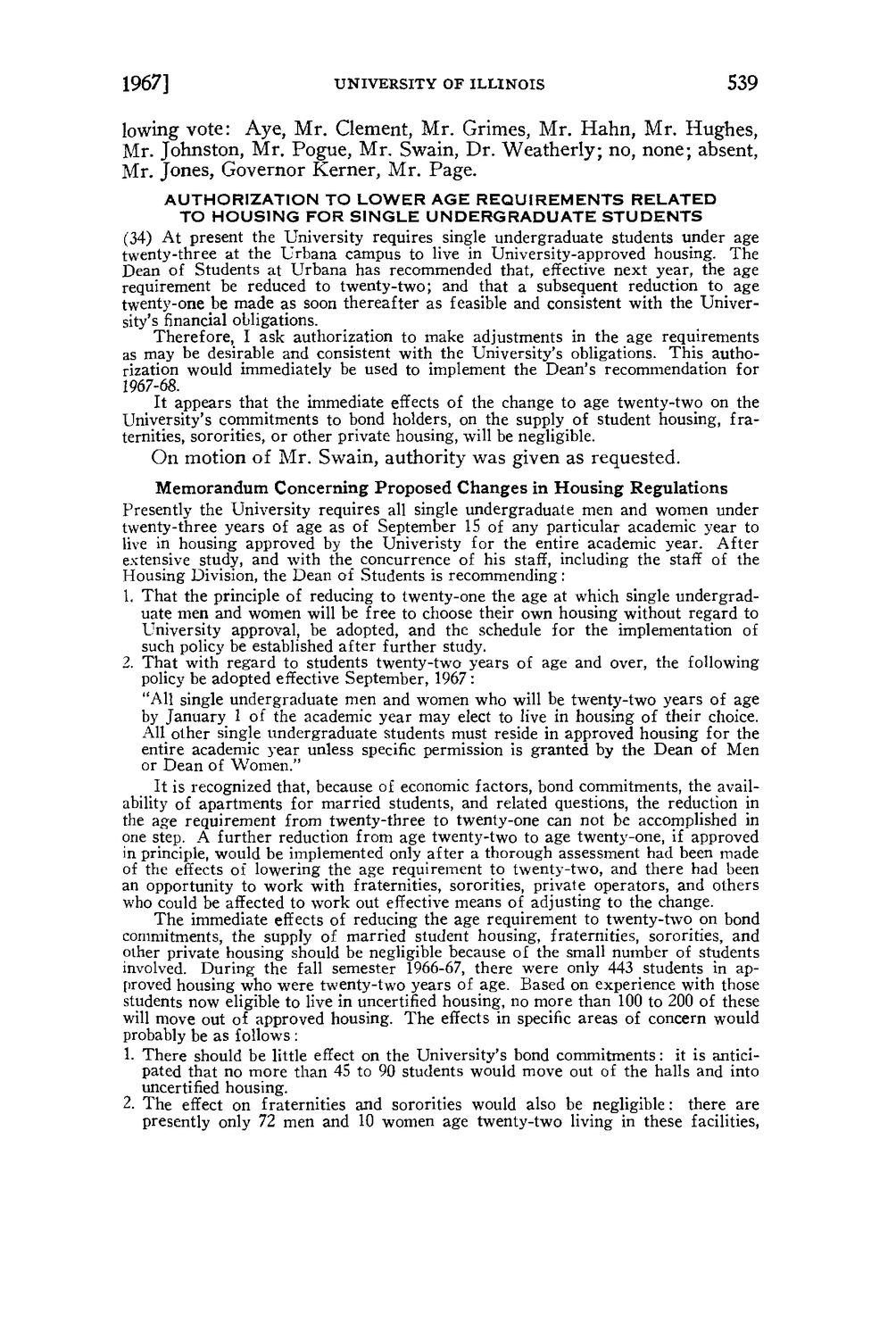| |
| |
Caption: Board of Trustees Minutes - 1968
This is a reduced-resolution page image for fast online browsing.

EXTRACTED TEXT FROM PAGE:
1967] UNIVERSITY OF ILLINOIS 539 lowing v o t e : A y e , M r . Clement, M r . Grimes, M r . H a h n , M r . H u g h e s , M r . Johnston, M r . P o g u e , M r . Swain, D r . W e a t h e r l y ; no, n o n e ; absent, Mr. Jones, Governor Kerner, Mr. Page. AUTHORIZATION TO LOWER AGE REQUIREMENTS RELATED TO HOUSING FOR SINGLE UNDERGRADUATE STUDENTS (34) At present the University requires single undergraduate students under age twenty-three at the Urbana campus to live in University-approved housing. The Dean of Students at Urbana has recommended that, effective next year, the age requirement be reduced to twenty-two; and that a subsequent reduction to age twenty-one be made as soon thereafter as feasible and consistent with the University's financial obligations. Therefore, I ask authorization to make adjustments in the age requirements as may be desirable and consistent with the University's obligations. This authorization would immediately be used to implement the Dean's recommendation for 1967-68. It appears that the immediate effects of the change to age twenty-two on the University's commitments to bond holders, on the supply of student housing, fraternities, sororities, or other private housing, will be negligible. O n m o t i o n of M r . S w a i n , a u t h o r i t y w a s g i v e n a s r e q u e s t e d . M e m o r a n d u m C o n c e r n i n g P r o p o s e d C h a n g e s in H o u s i n g R e g u l a t i o n s Presently the University requires all single undergraduate men and women under twenty-three years of age as of September IS of any particular academic year to live in housing approved by the Univeristy for the entire academic year. After extensive study, and with the concurrence of his staff, including the staff of the Housing Division, the Dean of Students is recommending: 1. That the principle of reducing to twenty-one the age at which single undergraduate men and women will be free to choose their own housing without regard to University approval, be adopted, and the schedule for the implementation of such policy be established after further study. 2. That with regard to students twenty-two years of age and over, the following policy be adopted effective September, 1967: "All single undergraduate men and women who will be twenty-two years of age by January 1 of the academic year may elect to live in housing of their choice. All other single undergraduate students must reside in approved housing for the entire academic year unless specific permission is granted by the Dean of Men or Dean of Women." It is recognized that, because of economic factors, bond commitments, the availability of apartments for married students, and related questions, the reduction in the age requirement from twenty-three to twenty-one can not be accomplished in one step. A further reduction from age twenty-two to age twenty-one, if approved in principle, would be implemented only after a thorough assessment had been made of the effects of lowering the age requirement to twenty-two, and there had been an opportunity to work with fraternities, sororities, private operators, and others who could be affected to work out effective means of adjusting to the change. The immediate effects of reducing the age requirement to twenty-two on bond commitments, the supply of married student housing, fraternities, sororities, and other private housing should be negligible because of the small number of students involved. During the fall semester 1966-67, there were only 443 students in approved housing who were twenty-two years of age. Based on experience with those students now eligible to live in uncertified housing, no more than 100 to 200 of these will move out of approved housing. The effects in specific areas of concern would probably be as follows : 1. There should be little effect on the University's bond commitments: it is anticipated that no more than 45 to 90 students would move out of the halls and into uncertified housing. 2. The effect on fraternities and sororities would also be negligible: there are presently only 72 men and 10 women age twenty-two living in these facilities,
| |